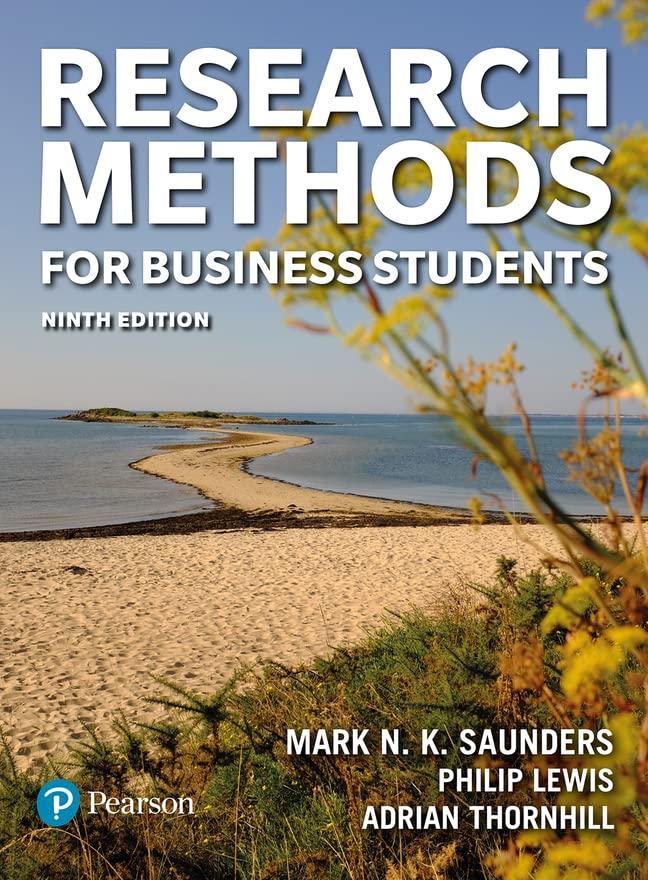Michael is in his last year of undergraduate studies in human services and economics and is conducting
Question:
Michael is in his last year of undergraduate studies in human services and economics and is conducting original research for his final research project. As part of his project, he is required to keep a reflective research journal (also known as a reflective diary)
and will be assessed on it along with his project.
His research methods’ lecturer has instructed him to make weekly journal entries consisting of two parts:
first, a table where he is to record the time of day he wrote, the length of time spent writing, and the focus of his writing; and second, an open response where he is to reflect critically on both his research process and the content of his research.
Michael sits down to write his reflective journal entry and his mind is blank even though his research methods’ lecturer provided an example in class on how to write it. Where to begin? What to write about? Is he even going to be able to fill the onepage requirement? Since his writing process and topic seem so different from what was discussed in class, he is feeling a bit lost about where and how to begin his journal. Despite feeling unsure, he starts typing away as his thoughts float from idea to idea in a stream of consciousness. After 30 minutes, he is surprised to find he has written over 300 words. Although he has filled a page, he does not feel confident that he has done it right or that it is helping him gain clarity about the focus of his research or his process. He decides to email it to his project tutor for feedback:

This week's experience
I am to spend a minimum equivalent of 15 minutes of writing time per day each week (Gray, 2020). Here is my writing record:
Part 2:
This week Monday–Sunday I worked on improving my literature review on two different days and met with the support staff at the University’s Writing Centre. I reckoned what I had written for my literature review was not that good and was hoping to learn how to improve it.
The person I met with in writing support was only able to help me with a few small things like referencing, most of which I already knew. However, I was asked to read my work out loud, and I was surprised by how much that helped. It made punctuation errors clearer.
I really want to improve my writing techniques, but I am not sure about how to do that.
Speaking with the writing support person was not as useful as I hoped it would be. When I have asked my friends to read my work and be honest, they say it is ‘fine’. But I hate it when I turn in the ‘fine’ draft and my paper comes back ‘bleeding’, covered in questions and corrections from my instructor. It’s clear that I need to start thinking and writing more critically.
After visiting the Writing Centre, I should be able to read my own work and see the flaws in my own arguments. I suppose I want to write better so people can’t poke holes in what I am writing and criticise me. By my next draft, I should have cut the number of track change comments by half.
As for the literature review itself, I drew upon notes I made while studying abroad in Ghana. While there, I observed a microcredit lending program for women who wanted to run their own stands at the local street market. I found a few research reports written by international aid organisations, but I have had some trouble finding peer-reviewed sources that address the topic and population I’m studying for my research project. Since it’s a newer area of study, I’m hoping these sources will suffice.
Questions
1 Which parts of Michael’s journal entry, if any, were reflective or reflexive? Give reasons for your answer, including the evidence you used to inform your assessment.
2 The journal entry was to consist of two parts: first, a table that summarises data points about his writing practices for the week; and second, a critical reflection of his research process and content. To what extent, if any, did Michael fulfil these requirements? Is there a better way he could have approached and written the research journal entry? In your answer, state how you assessed the entry and include examples that illustrate your point. If you think there was a better approach, describe it.
3 Imagine you are Michael’s project tutor and you need to give him feedback. Reread his entry, making comments throughout it. While critiquing and commenting, be sure to note what he has done well and provide specific feedback on what he could do to strengthen it.
Step by Step Answer:

Research Methods For Business Students
ISBN: 9781292402727
9th Edition
Authors: Mark Saunders, Philip Lewis, Adrian Thornhill





